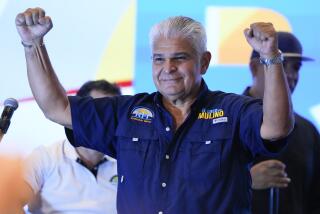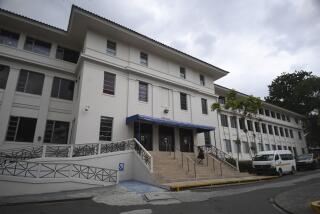Scale of Panama Corruption Huge : Investigation: New regime targets 300 ex-officials. Records indicate 20% of the budget went to graft.
- Share via
PANAMA CITY — Combing through the ruins of Manuel A. Noriega’s dictatorship, Panamanian investigators have prepared more than 300 cases of corruption against former officials accused of bleeding the treasury through padded payrolls, illegal procurements and other embezzlement schemes.
Evidence from the records that escaped systematic destruction by Noriega’s fleeing supporters suggests that at least one-fifth of Panama’s national budget was pilfered on salaries of political appointees who showed up at work only to collect paychecks, according to officials of the new U.S.-installed government.
With Noriega in American custody and out of the country, Panamanians are turning their attention to the mess he left behind and how to clean it up. Officials looking into the files say they are finding the scale of corruption far greater than they imagined.
“Don’t congratulate me,” Mayor Guillermo Cochez told a well-wisher Thursday, the morning after invading U.S. troops took Noriega prisoner. “It’s all craziness here. The public administration of the Noriega regime was based only on seeing how much they could steal. And what they stole was incredible.”
After a week at City Hall, Cochez has asked the new prosecutor to file charges in two corruption cases against his predecessor, Mayor Jilma Noriega, who once claimed to be a relative of Gen. Noriega but no longer does.
In one case, she is accused of leasing a municipally-owned gasoline station to the Shell Oil Co. for 1/30th of the rent required by law, on the condition that Shell sublease it at a similar rate to a local company owned by one of her relatives.
The other alleged scheme was more brazen. For the past four years, Cochez charged, Mayor Noriega personally raked off half the municipal tax payments delivered to City Hall each January--about $10,000 per day for each day of the month.
Armed with photos and newly discovered lists of people in Noriega’s paramilitary Dignity Battalions, the new mayor has begun to fire potential troublemakers from the municipal payroll. In addition, he is working to identify and eliminate phantom workers who drew salaries while doing no work.
The sudden purges, also under way in 12 government ministries, have put President Guillermo Endara’s administration at odds with union leaders once supportive of Noriega. The conflict is already poisoning the wave of relief felt generally in Panama after Noriega’s departure.
Panama’s justice system, corrupted during 21 years of military rule, is being revamped to settle such disputes and to try the growing docket of corruption cases. But judicial reform has been delayed, and complicated, by the sabotage of Supreme Court records the day after Noriega’s ouster in the Dec. 20 U.S. invasion.
Court workers have told Panamanian investigators that they saw one or more Supreme Court magistrates setting fire to their own files. A blaze swept through the court offices, on the top floor of the four-story Justice Ministry headquarters, destroying most of the case records.
“What the fire didn’t destroy the fire hoses did,” said Cesar Quintero, one of eight newly appointed magistrates on the nine-member court. “This wasn’t the work of common looters but high-level officials. They did this to make the new court’s work difficult and to destroy old cases of justice being rigged and sold out.”
Throughout the white colonial justice building, now abandoned, are computers, photocopiers, fax machines and filing cabinets methodically smashed with axes and iron bars. The new Supreme Court magistrates, who are to name lower court judges, are still looking for new quarters.
Three other badly damaged agencies have been unable to reopen, including the Finance Ministry, where Noriega supporters mined the elevators with explosives before leaving. Col. Pasqual Gonzalez, the head of civil aviation, booby-trapped his own desk.
“The order to the Dignity Battalions was to level the land, like Attila the Hun, destroy everything,” said an investigator for the new government.
Even so, he said, about 40 tons of files salvaged from government offices and homes of Noriega supporters have been taken to American military bases in Panama for scrutiny by the U.S. Drug Enforcement Administration and the CIA.
American troops are also holding more than 50 top Panamanian military and civilian officials at a high-security jail on one of the bases. They are being questioned for information to bolster the federal drug-trafficking and money-laundering indictments against Noriega in Florida.
The 300 criminal cases being prepared by Panamanian authorities are based on evidence gathered by the controller general, Panama’s chief fiscal investigator, and sent to the attorney general. Both men were named by President Endara.
The controller’s oceanfront skyscraper headquarters sustained more than $1 million in damage when rocket-firing U.S. helicopters tried to blow up the National Radio studios, lodged on a high floor. The building’s rooftop power plant was destroyed instead, but the ground-floor computer room, a treasure chest of financial information, survived.
Officials there said that about half the cases sent to the prosecutor’s office last week had been investigated during Noriega’s seven years in power but shelved on orders of his Panama Defense Forces.
Many of the cases center on the growing economic power of the now-disbanded Defense Forces, which took profits out of everything from vehicle registration to import-export trade and became even wealthier as U.S. economic sanctions against Noriega drove the rest of the country into a deep recession.
“There’s everything in those files,” an investigator said. “Widespread corruption, money laundering, contraband, graft, payola. . . . It was a big business!”
While such practices had become well-publicized political grievances against Noriega, Panamanian officials said they are no less stunned by what they have found. They said it has deepened their conviction that the U.S. intervention was justified.
“The extent of the corruption was more than we thought,” Controller General Ruben Carles said in an interview. “We didn’t know how deeply the military was involved (in the economy). Now we are seeing this monstrosity from the inside. The possibilities of getting these people out (of power) except by force would have been zero.”
He said that the Defense Forces used the National Bank of Panama, which is now under investigation, to conceal their financial dealings “with overdrawn accounts, phony loans, destroying of documents that were backing up loans and concessions.”
In the first major embarrassment for the new administration, Col. Roberto Armijo was forced to resign last week as chief of Panama’s new Capital Public Security Force after auditors discovered that he and members of his family had more than $1.2 million in certificates of deposit in that bank.
Another entity under investigation is Transit S.A., a private company managed by Carlos Duque, Noriega’s handpicked presidential candidate in the elections of last May.
Transit was authorized to impose a “service fee” on most trade through the Colon Free Zone (a merchandise transshipment facility, free of customs duties) and turned the revenues--$275 million a year, according to U.S. sources--over to Noriega’s family and a few high-ranking military officers. The company has been taken over by the state and the fee has been eliminated.
While Duque remains at large, new information on Transit is coming from Rafael Ceballos, his top deputy at the company for 18 years. In an interview two weeks ago, before surrendering to U.S. and Panamanian authorities in Colon, Ceballos said that he kept records of “every single check” and is willing to spill the company’s secrets.
While a full picture of corruption under Noriega will take months to emerge, several government officials said it was far more costly to Panama than the U.S. sanctions aimed at getting rid of him. The total value of Panama’s economy shrank 40% in 1988 and 1989, after the sanctions were imposed, and unemployment climbed to at least 30%.
As it seeks $1.2 billion in emergency aid from the United States, the Endara government is scrambling to eliminate phantom employees and thus save hundreds of millions of dollars in salaries.
Such an employee is known here as a botella , or bottle. Some Panamanians say the term is meant to suggest an empty bottle, something that has outlived its usefulness; others say it stems from the image of a bum drinking booze from a bottle instead of working.
The presidential palace payroll, at the time of the American invasion, was top-heavy with bottles, according to Miguel Batista, the new vice minister there.
Of 360 employees, he said, the first 47 below Noriega’s handpicked president, Francisco Rodriguez, did not work in the palace. All earned between $1,500 and $3,000 per month and held such titles as “coordinator of planning” and “executive assistant.” Some were union leaders who really worked elsewhere and drew two or more salaries.
“These are the only ones we’ve discovered so far in this ministry because they are notorious cases,” Batista said, studying a computer printout of the payroll. “We are going to keep investigating, and surely more botellas will appear. In all government institutions, we’ve found this phenomenon.”
More to Read
Sign up for Essential California
The most important California stories and recommendations in your inbox every morning.
You may occasionally receive promotional content from the Los Angeles Times.













